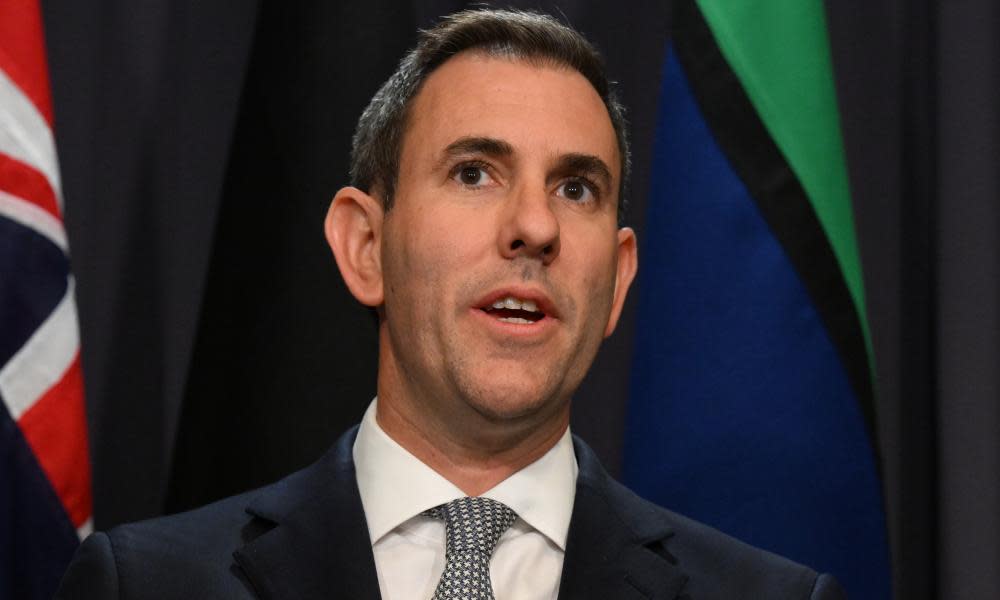Jim Chalmers says he will make the ‘right decisions’ on stage-three tax cuts

The Treasurer, Jim Chalmers, says he is prepared to make the “right decisions” even if they are politically difficult, preparing the ground for changes to the stage three tax cuts in the October budget.
Pointing to a worsening global economic outlook and a “probable” recession in the United States, Chalmers said the government would be guided by what was responsible, affordable and sustainable as it finalised the budget due in three weeks’ time.
He said that while the government’s policy on the tax cuts had not yet changed, “any responsible government” would be looking at the economic pressures in the global economy as it determined the best course of action domestically.
“It is really important that our budget settings reflect the economic conditions – that is the guiding light when it comes to putting a budget together,” Chalmers said on Tuesday.
“The guiding light in lots of ways is what is responsible, what is affordable, what is sustainable and what is sufficiently targeted to deal with the economic challenges and budget pressures which are becoming more, and not less, serious.
“We will put together and release a budget in three weeks’ time which is calibrated to these economic conditions as we confront them.”
He said people could expect the government to “take the right decisions for the right reasons”.
“I will always put the right economic outcome above a political outcome, I will take a difficult decision if it’s necessary working with my colleagues, because these are difficult times and people should expect a solid budget, they should expect a considered budget,” he said.
“My job and the government’s job is to take the right decision, even if it’s difficult, to put the economics before the politics and let the political cards fall where they may.”
When asked if there were parallels between the UK’s scrapped tax cut plan and the debt-funded stage three tax cuts, which overwhelmingly benefit higher income earners in Australia from 2024, Chalmers said what had played out “was not irrelevant to us”.
“It is a cautionary tale about what can happen if you get your policy settings out of whack in a way that does not suit the economic conditions and particularly the global economic conditions,” he said.
“So we are very attentive to what is happening in the United Kingdom. A big part of our considerations is what is happening in the global economy, what’s happening in the UK, the US , China, Europe, and what that means for us at home, so I think any responsible government sees what is happening in the UK and factors that into their own considerations.”
The government’s apparent repositioning on the tax cuts prompted the opposition leader, Peter Dutton, to accuse it of “crab walking” away from an election commitment. He also insisted the tax plan was different to the UK’s as the top marginal tax rate remained unchanged.
“It is clear that the prime minister and the treasurer are trying to crab walk away from the stage three tax cuts…despite the fact that they voted for them in the Parliament and they looked the Australian public in the eye and said that they would keep those tax cuts,” Dutton said.
“It’s no parallel whatsoever with the United Kingdom and what’s happening there at the moment and that cannot be used as justification for Labor to break another core promise to the Australian public.”
Earlier, Australia’s environment minister, Tanya Plibersek, criticised the UK’s scrapped tax cut plan for high income earners, saying any change to Labor government policy on stage-three tax cuts would consider the country’s “tough economic position”.
Under the third stage of tax cuts that were legislated with Labor’s support in 2019, the $120,000-to-$180,000 tax bracket will be removed, the top tax bracket threshold will increase from $180,000 to $200,000, and the marginal tax rate for those earning between $45,000 and $200,000 will drop from 32.5% to 30%.
The prime minister, Anthony Albanese, has stood by the government’s committed support for the controversial tax package, but has left open the possibility of amending it after previously expressing concern about the overwhelming benefits to high income earners.
Plibersek said on Tuesday that the government went to the election with a commitment to continue the tax package, and its focus was on “reforming our tax system is to make sure that large companies and multinationals are paying their share of tax”.
However, she criticised the Truss administration in the UK for a plan that would have abolished the top 45% tax rate for people earning more than £150,000, which was dumped after widespread condemnation.
“Well, what the UK does with their taxes is a matter for them. But it didn’t seem very sensible to me, what the Conservatives there were proposing,” Plibersek told ABC Radio National.
“I think it’s important for us to have a look at the October budget statement that Jim Chalmers will release, and have a good look at the state of the economy there and Labor’s plans to repair it.”

 Yahoo Movies
Yahoo Movies 
